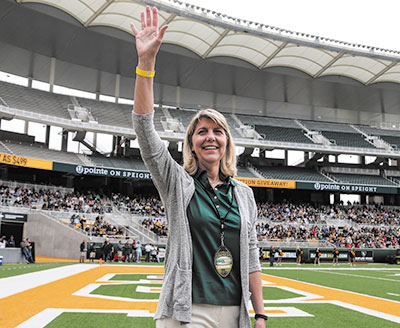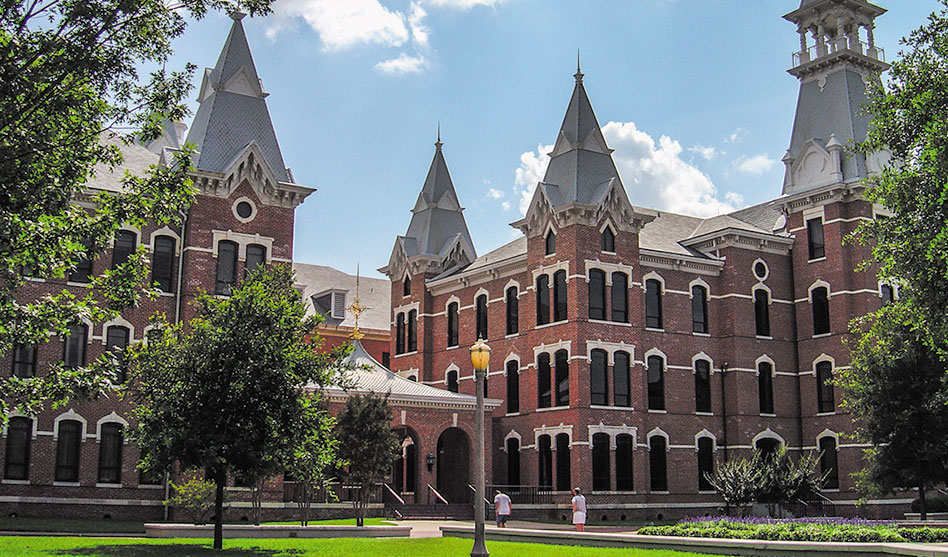The Burleson Quadrangle on the Baylor University campus
DOE exempts Waco-based university from requirement to investigate complaints of anti-LGBTQ harassment
JAMES RUSSELL | Contributing Writer
jamesjourno@gmail.com
Baylor University is in the hot seat after the Department of Education in July granted the Baptist university in Waco a religious exemption from a Title IX sexual harassment complaint filed by a former student who is LGBTQ. Baylor asked the DOE to dismiss this complaint and others because, university officials said, the claims were inconsistent with the university’s religious tenets.
Veronica Bonifacio Penales filed a complaint in 2021 accusing Baylor of failing to investigate anti-LGBTQ harassment, according to the Religious Exemption Accountability Project, which defends the rights of LGBTQ students and other marginalized students at conservative colleges, including on Title IX, the federal rule protecting against discrimination based on sex in education programs or activities in federally funded schools.

Baylor University President Dr. Linda Livingstone
In her complaint, Bonifacio Penales said that while she was a student at the Waco school, she found sticky notes with homophobic slurs on her dorm room door and had homophobic language posted on her social media pages. She filed the complaint with the DOE after, she said, Baylor failed to address the harassment.
According to REAP, two other LGBTQ Baylor alumni also have active Title IX complaints currently under federal investigation.
Baylor officials, however, were not only responding to Penales’ case but a slate of others as well, including denying official recognition of the LGBTQ-friendly Gamma Alpha Upsilon, LGBTQ-based harassment and pressuring student media to not report on LGBTQ protests on campus.
Last month, Baylor President Linda Livingstone sent a schoolwide email pushing back against allegations it will discriminate against LGBTQ students in sexual harassment cases: “There will be NO CHANGES to Baylor’s current practices or policies related to sexual harassment and other forms of sexual and interpersonal conduct resulting from this assertion of our existing religious exemptions. Our Office of Equity, Civil Rights and Title IX will continue to investigate sexual harassment allegations or related complaints and investigate these thoroughly and fairly,” she wrote and calling the decision “a narrow, yet complicated legal matter that has implications for all religious-based universities, not just Baylor.”
Livingstone added the school was responding to current considerations by the DOE “to move to an expanded definition of sexual harassment, which could infringe on Baylor’s rights under the U.S. Constitution, as well as Title IX, to conduct our affairs in a manner consistent with our religious beliefs.”
In 2021, the department expanded the interpretation of Title IX to include discrimination based on sexual orientation and gender identity. In July of last year, the Department of Education proposed strengthening rules related to survivors of sexual assault and beefed-up protections for LGBTQ students. Those rules are set to be released next month.
In an open letter opposing the exemption, more than a thousand Baylor faculty, staff, students and alumni and Baptist leaders argued against it.
“Our concern, first and foremost, is for LGBTQIA+ members of the Baylor University family — people who continue to be subject to separate and unequal treatment in campus life, “ they wrote. “As members of the Baylor family, we believe that all people are created in the image of God and entitled to dignity and respect.”
Other issues, the signatories argued, include the university’s argument it is also governed by the Baptist General Convention of Texas rules, to which the DOE had agreed, and bound by various convention mandates.
Last week, five members of Congress sent a letter to the DOE urging the department to reconsider its decision. In the letter, Reps. Adam Schiff and Mark Takano of California and Rep. Joaquin Castro of San Antonio, Rep. Veronica Escobar of El Paso and Rep. Greg Casar of Austin wrote the decision “is not only unprecedented but is a blatant attempt to interfere and pressure the department to stop an ongoing sex-based harassment investigation. That is unacceptable.”
Jonathan Gooch, communications director at Equality Texas, also slammed the decision: “Texas universities owe a duty of care to their students, yet Baylor has sought assurances that they can neglect LGBTQ+ students and not fear reprisal from the U.S. government,” he wrote.
“There is a long list of specific Title IX provisions from which Baylor has sought to be exempt, but perhaps the most alarming is tied to claims of sexual harassment,” Gooch continued. “To think that LGBTQ+ students would have their trauma dismissed rather than investigated, simply because they are LGBTQ+, is indefensible.”


